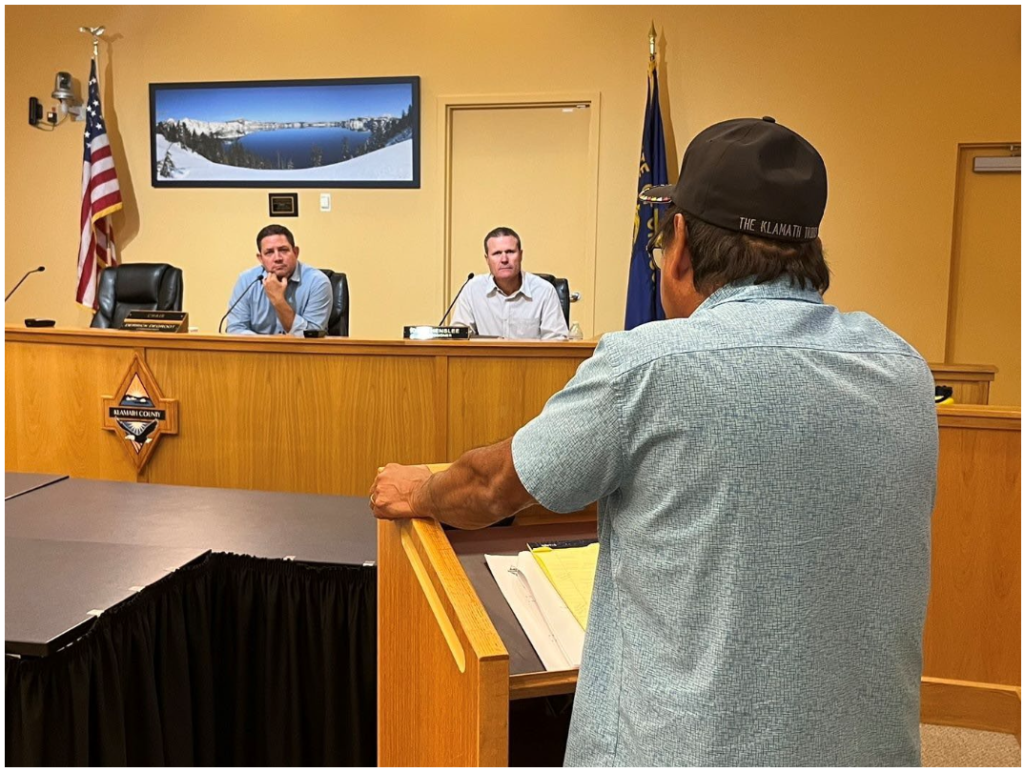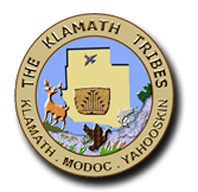FOR IMMEDIATE RELEASE
Date: August 10, 2023
Contact: Ken Smith, Public Relations Director
kenneth.smith@klamathtribes.com ; 541-783-2219 ext. 147
Download full .pdf press release
Klamath Tribes Members Speak at Public Hearing for Environmental Protection and Public Access Change of Hagelstein Park
CHILOQUIN, Ore. – A public hearing was held Tuesday, Aug. 8, at the Klamath County Commissioners Chamber to discuss the possible closure of Hagelstein Park to overnight camping and making it a day use park only, and implementing other measures to protect and improve the park’s overall environment.
The park has slowly degraded over the years due to overuse and illegal camping and swimming in the spring-fed pond located in the park adjacent to Highway 97. The pond is also home to an estimated 700 endangered c’waam and koptu suckers and the only place in the world where they live from hatchlings through adulthood to spawn a single, small body of water where they live their entire life.
Klamath County Commissioners Derrick DeGroot and Dave Henslee listened to public testimony, which began with a statement from Klamath Tribes Chairman Clayton Dumont. He explained the importance of the small pond at the park fed by springs and home to an estimated 700 c’waam and koptu endangered suckers, and that it was a place of many springs, and this site, in particular, was a spiritual place for the tribal ancestors.
“In pre-global warming times, this is a place that did not freeze in the harshest of winters,” Dumont said. “So, it was a source of fresh water. It was a source of fishing. And if you had approached it before settlers came, before the Federal Railroad cut it off from the lake, before the new highway, you would have seen that it was the origin, the genesis of lush wetlands that extended both out into the lake and southward through what is now agricultural land, into wokas…All kinds of native grasses, birds of all kinds, and eggs. I hate to use the analogy, but it was a kind of Garden of Eden; it really was a very, very
special place.”
Dumont stated that the park had become a mistreated place, and he would like to see the Klamath Tribes partnering with the County to offer greater protection for the fish and the pond so that it can be enjoyed by all who visit what is considered a sacred tribal site.
“My hope is for it to be protected,” he said. “And again, we’re grateful to the County for wishing to partner with us to do what we can to take care of the site. And I also want to say that we certainly understand the importance of having a vibrant economy; we understand the need to diversify our economy, and we understand that tourism may be a part of that. What we would really like to see is some controlled tourism. And I think we can partner with you in that way.
“And I’m speaking only as one person, and there are 5,800 of us, and I have not yet passed this to our General Council. But I would love to see a situation where the Klamath Tribes were to present information about our history, about our culture, to the larger public while protecting this place and looking at something that all of us could be very proud of.”
Alex Gonyaw, Senior Fisheries Biologist for the Klamath Tribes Ambodat Department, spoke next and emphasized the need for vegetation and trees to be planted to offer shade and protection for the suckers. He also said the water in the pond has, for the first time, experienced algal bloom, which showed up in the spring. Gonyaw attributes algal growth to excess nutrients entering the aquatic systems around the park. He said water quality samples were taken from the pond, and the results produced fecal coliform, E. coli, which was present in the first sample at a level of 80, and the second sample at 18. The World Health Organization identifies anything between 11 and 100 as medium risk.
Gonyaw said he’d like to see the park treated as a locked preserve with occasional vehicle access allowed and vigilant enforcement of rules, and he would like the County to allow the Klamath Tribes to be active stewards of the park.
Kathleen Buchanan spoke as a representative of the Hagelstein family. Buchanan is married to Bob Buchanan, whose great uncle is Bill Hagelstein, the donator of the park to Klamath County. Buchanan spoke directly to the commissioners. “What used to be a paradise, an oasis, has turned into a garbage dump, criminal activity place.” And she stated her support for making it a day-use park only. “It is a beautiful, beautiful spot, and I’ve been going out there for 50 years and my husband for 70. And to see it deteriorate to the point that it is, it’s saddening, and I’m not a tribe member, but I can certainly feel the
pain that they see every time they go out there. So, I’m 100 percent for it. If you shut that down and make it a day use purpose, like it should be, and be treated with the respect that’s necessary, then we’re 100 percent behind you guys.”
After the public spoke, Commissioner DeGroot addressed the audience. He said they have been talking about the park for several years and the issues it is facing. He said that each time he drives by the park, it appears to be getting worst. He said it was closed down to visitors during COVID, and when it was reopened, it quickly deteriorated. DeGroot said the health of the park and the suckers in the pond are important to care for — not only to the Tribes but the entire community of Klamath County. And it also applies to Upper Klamath Lake and its headwaters.
“If we have a thriving fish population, it solves so many problems for our entire community,” he said, “All the way up from the headwaters of the Williamson to the mouth of the Klamath and to the ocean. So many problems get solved when we have a thriving fish population. All of our industries are able to be taken better care of; we have a better economy; we have happier people; we have a happier community if we have a lake that’s better-taken care of. We have an incredible asset.”
DeGroot finished his statement by emphasizing the need for greater stewardship not only for Hagelstein Park but all the parks in the County. “We have to do a better job of taking care of these places so that we can have a community that we’re proud of,” he said. “And when I drive by Hagelstein Park over the course of the last couple of years, it’s not something that I’ve been proud of, and I think that we can do better.”
A final decision on possible park changes will be made next Tuesday, Aug. 15, during an administrative meeting.

Klamath Tribes Chairman Clayton Dumont addresses Klamath County Commissioners Derrick DeGroot (left) and Dave Henslee during a public hearing on Hagelstein Park public access and the need for environmental safeguards and improvements. (Photo by Ken Smith/Klamath Tribes. Image available for media use.)





